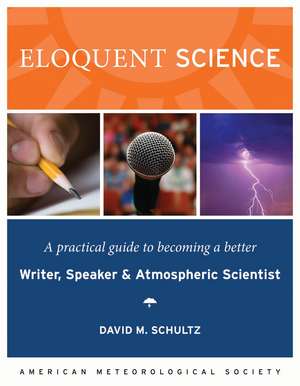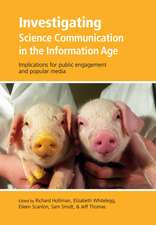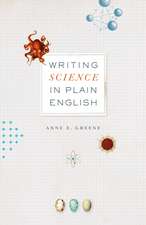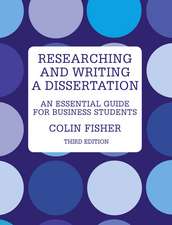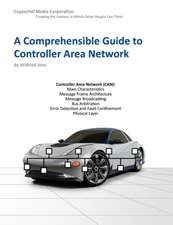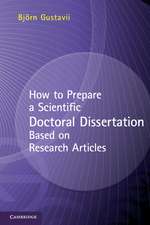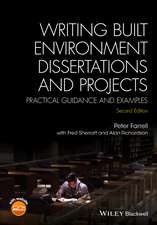Eloquent Science: A Practical Guide to Becoming a Better Writer, Speaker, and Atmospheric Scientist
Autor David Schultzen Limba Engleză Hardback – 4 ian 2010
Preț: 270.09 lei
Nou
Puncte Express: 405
Preț estimativ în valută:
51.69€ • 54.53$ • 43.08£
51.69€ • 54.53$ • 43.08£
Carte disponibilă
Livrare economică 12-26 decembrie
Livrare express 27 noiembrie-03 decembrie pentru 46.59 lei
Preluare comenzi: 021 569.72.76
Specificații
ISBN-13: 9781878220912
ISBN-10: 1878220918
Pagini: 448
Ilustrații: 440 p. 41 illus.
Dimensiuni: 178 x 229 x 33 mm
Greutate: 0.82 kg
Ediția:1st ed. 2009
Editura: American Meteorological Society
Colecția American Meteorological Society
Locul publicării:Boston, MA, United States
ISBN-10: 1878220918
Pagini: 448
Ilustrații: 440 p. 41 illus.
Dimensiuni: 178 x 229 x 33 mm
Greutate: 0.82 kg
Ediția:1st ed. 2009
Editura: American Meteorological Society
Colecția American Meteorological Society
Locul publicării:Boston, MA, United States
Descriere
Mary Grace Soccio. My writing could not please this kindhearted woman, no matter how hard I tried. Although Gifed and Talented seventh-grade math posed no problem for me, the same was not true for Mrs. Soccio’s English class. I was frustrated that my frst assignment only netted me a C. I worked harder, making re- sion afer revision, a concept I had never really put much faith in before. At last, I produced an essay that seemed the apex of what I was capable of wr- ing. Although the topic of that essay is now lost to my memory, the grade I received was not: a B?. “Te best I could do was a B??” Te realization sank in that maybe I was not such a good writer. In those days, my youthful hubris did not understand abouc t apacity bui- ing. In other words, being challenged would result in my intellectual growth— an academic restatement of Nietzsche’s “What does not destroy me, makes me stronger.” Consequently, I asked to be withdrawn from Gifed and Talented English in the eighth grade.
Cuprins
The Process of Publishing Scientific Papers.- Should You Publish Your Paper? Questions to Ask Before You Begin Writing.- Writing an Effective Title.- The Structure of a Scientific Paper.- The Motivation to Write.- Brainstorm, Outline, and First Draft.- Accessible Scientific Writing.- Constructing Effective Paragraphs.- Constructing Effective Sentences.- Using Effective Words and Phrases.- Figures, Tables, and Equations.- Citations and References.- Editing and Finishing Up.- Authorship and Its Responsibilites.- Scientific Ethics and Misconduct.- Guidance for English as a Second Language Authors and Their Coauthors.- Page Proofs, Publication, and Life Thereafter.- Methods and Approaches to Writing for the Atmospheric Sciences.- Editors and Peer Review.- Writing a Review.- REsponding to Reviews.- How Scientific Meetings Work.- The Abstract and Extended Abstract.- Accessible Oral Presentations.- Constructing Effective Oral Presentations.- Delivering Compelling Oral Presentations.- Potent Poster Presentations.- Challenges to Delivering Your Presentations.- Communication in the Workplace.- Communication with the Public Media.- Furthering Your Journey.
Notă biografică
David M. Schultz is a professor of experimental meteorology in the Division of Atmospheric Sciences and Geophysics, Department of Physics, University of Helsinki, and the Finnish Meteorological Institute in Helsinki, Finland. He was born in Pittsburgh, PA, received his B.S. degree from M.I.T., his M.S. degree from the University of Washington, and his Ph.D. from the University at Albany, State University of New York. From 1996 to 2006, he worked for the NOAA/National Severe Storms Laboratory and the University of Oklahoma. In 2001, he won the American Meteorological Society Editor’s Award for Monthly Weather Review. Presently, he is Chief Editor for Monthly Weather Review, cofounder and Assistant Editor for the Electronic Journal of Severe Storms Meteorology, Associate Editor for Atmospheric Science Letters, and on the Editorial Board of Geophysica. He has published over 75 articles on dozens of topics in synoptic and mesoscale meteorology, forecasting, and cloud and precipitation microphysics, as well as articles on scientific publishing and the cost of scientific conferences.
Textul de pe ultima copertă
What started out as a communications workshop tailored for undergraduate and graduate students in atmospheric science evolved into a book that will benefit scientists at any stage in their careers. Eloquent Science draws on Schultz’s experience as a journal editor and prolific writer, the insight of his colleagues, and the best advice from hundreds of sources. This must-have reference is loaded with tips for writing and reviewing scientific journal articles and creating and delivering scientific presentations, and features: Help for the entire writing process from planning to proofing, including dealing with writer’s block, creating effective figures, advice for non-native speakers of English, and an appendix of commonly misused scientific concepts; A peek behind the curtain into the operations of editorial boards and publishers of scientific journals—helpful whether writing your own review or responding to someone else’s; Guidance on getting your conference abstract accepted, making effective slides and poster presentations, and presenting with confidence; and sidebars written by experts on topics including citing others’ work, how to critique a scientific paper, answering questions at a conference, and communicating with the media. The result is the ultimate communications manual for undergraduate and graduate students as well as researchers in the atmospheric sciences and intersecting disciplines. Every student, teacher, and science department should have a copy.
Caracteristici
Written by well-known author
Provides examples and step-by-step instructions
Comprehensive in scope
Focuses on selected topics
Provides a clear overview of the basics
Useful as a self-study guide
Includes supplementary material: sn.pub/extras
Provides examples and step-by-step instructions
Comprehensive in scope
Focuses on selected topics
Provides a clear overview of the basics
Useful as a self-study guide
Includes supplementary material: sn.pub/extras
